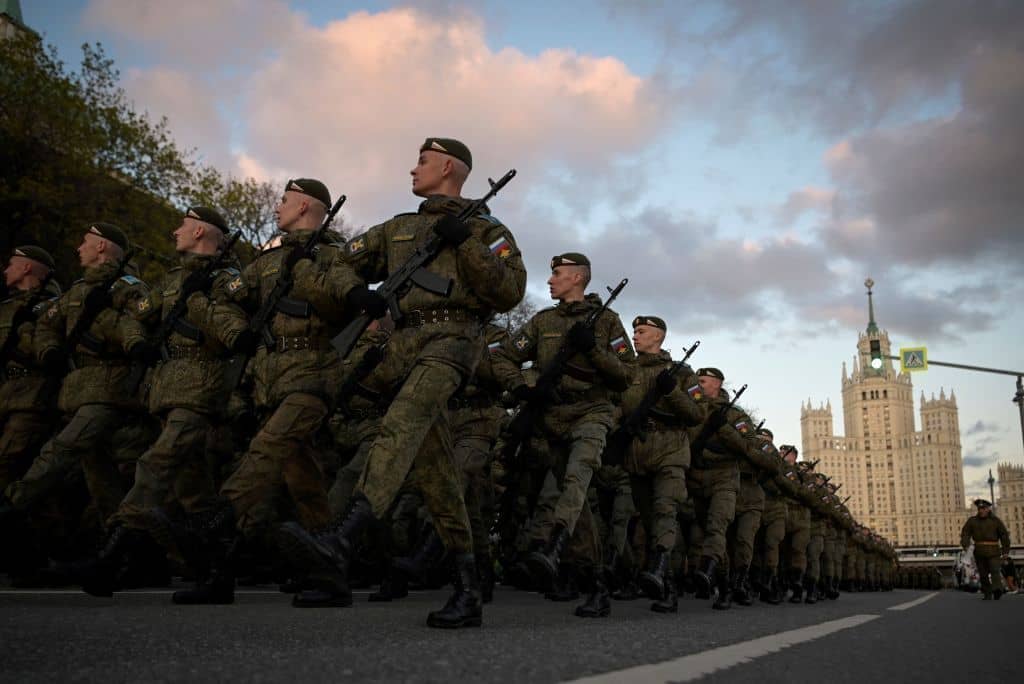Ahead of Russia’s annual Victory Day celebration on 9 May – which marks the date the Soviet Union defeated Nazi Germany – the world is once again playing a will he, won’t he game with Vladimir Putin. It is inconceivable that Putin will be able to declare any kind of victory in the Donbas on 9 May as he originally intended. The question now is whether he will use the anniversary to declare all-out war on Ukraine instead and fully mobilise Russian society.
It is a terrifying decision for Putin to face. The conquering army he sent into Ukraine has been shown to be deeply flawed, too small to conquer large amounts of territory, and inadequately led. It was humiliated in the Battle of Kyiv and the Russians were forced to withdraw to consolidate their army in the Donbas, where Putin was hoping to declare victory on 9 May.
Instead, Ukraine has stopped almost all Russian advances in the region. The Battle of the Donbas has been another bloody and expensive operation for the Russian army. And things could soon get significantly worse.
General mobilisation is a potential minefield that does not guarantee victory
Since the invasion on February 24 the Russians have been getting weaker and weaker as they have lost their best and most up-to-date equipment in battle. The Ukrainians, meanwhile, are getting stronger every day as they receive significant help from Nato countries, who have provided them with the kind of advanced weapons they could only have dreamt about before Putin invaded.
Soon Russia will not have enough troops to hold the 400 miles of front line it has seized in Ukraine. If Putin is actually going to continue this war through the summer, he will need significantly more troops and equipment – a new, large and powerful force that can fight an increasingly well-equipped Ukrainian army with high morale. Creating this new Russian army will require serious planning, the creation of a large training system, the manufacturing of more up to date equipment and a leadership in place that can deploy this properly.
Which is why there is increasing speculation that Putin will announce that Russia is fully mobilising on 9 May. Mobilisation would involve introducing conscription to bolster the Russian army’s depleting numbers and putting the economy on a total war footing so every bit of the state’s resources can be deployed in Ukraine.
It is a decision that is fraught with peril. If Putin says that Russia is mobilising he will be admitting that the war – which was sold to the Russian people as a liberation of their Ukrainian brothers from the grip of Nazis – was a fraud. It will be clear that Ukrainians are not welcoming the Russians with open arms. It will expose the failure of Putin’s war machine. And the president will be forced to tell Russians that conscripts will now have to fight and die in Ukraine.
If the political and societal optics weren’t bad enough, the other problem is that it very well might not work anyway. It is estimated to take around a year to produce a large number of well-trained soldiers capable of fighting after a mobilisation call. Russia would need to set up new training facilities, find soldiers capable of training others, train the actual conscripts, and then put these soldiers in units and deploy them to Ukraine. You might be able to get some troops ready in nine months, but they will inevitably be rushed through the process and almost certainly not ready for what they will face on the battlefield.
Then comes the question of what these new troops will be equipped with. We have heard for years that the Russians have vast stores of munitions. The country certainly has large depots full of what seems to be poorly maintained and often antiquated equipment. But the value of these munitions in a war against an increasingly modern and Nato equipped Ukraine will be increasingly limited.
Putin could try and manufacture new advanced equipment. But the basic weakness of the Russian economy makes that almost impossible. The Russian economy was low-tech before the war, and now, thanks to western sanctions, it has been cut off from supplies of vital components such as the microchips needed in large numbers to make modern vehicles, missiles, and aircraft.
General mobilisation may sound like a way for Putin to salvage his campaign in Ukraine – but it’s a potential minefield that does not guarantee victory.
In fact, if the Russian president was sensible, he would use the 9 May celebration to announce that he wants peace while his army is still in the field and occupying a large area of southern and eastern Ukraine. If he announced that he was willing to make a deal, negotiations could begin and Putin could try to rescue something from the disaster he’s unleashed. Sadly that seems ever more unlikely. Instead Putin will most likely use the 9 May celebrations as a call to arms. But on the battlefield, Russia is running out of options.






Comments